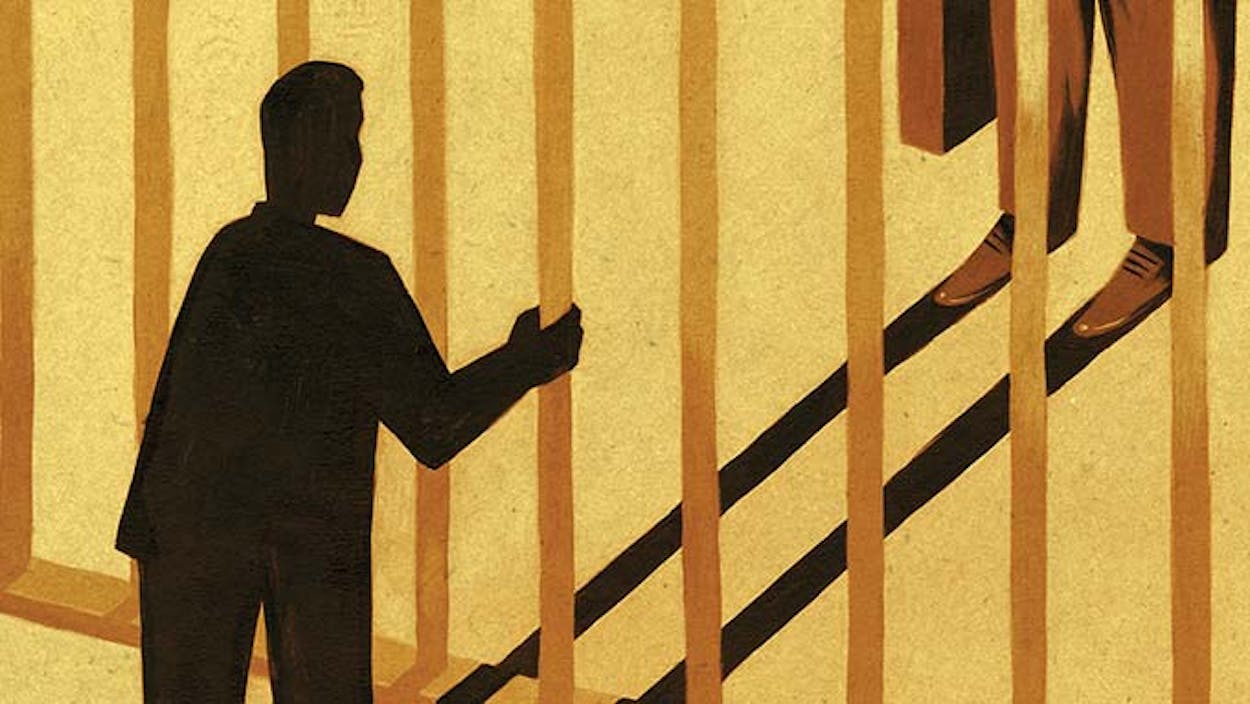There’s never been a shortage of competition for the title of Worst Lawyer in Texas. A top contender for years was the now-deceased Joe Cannon, who slept through much of the 1984 capital murder trial of his client Calvin Burdine, resulting in a death sentence that was later overturned on appeal. A more recent addition to the short list is Texas attorney general Ken Paxton, who is facing a possible indictment from a Collin County grand jury on first-degree felony charges of securities fraud and who encouraged county clerks to flout the Supreme Court’s ruling legalizing same-sex marriage. But at this moment, the distinction of Worst Lawyer goes to Charles Sebesta, the former district attorney for Washington and Burleson counties, who sent an innocent man to death row in 1994 by withholding exculpatory evidence. Sebesta was disbarred in June, but the fact that it took so long for him to be handed a punishment so inadequate is almost as shameful as what he did to Anthony Graves.
Had Sebesta wanted to own up to the monstrous injustice he perpetrated, he could have looked to A. M. Stroud III, a former prosecutor in Louisiana, for guidance. Stroud wrote an open letter to the Shreveport Times this March, affirming that a man he had sent to death row was innocent and taking responsibility for his role. “I apologize to Glenn Ford for all the misery I have caused him and his family,” Stroud wrote. “I apologize to the family of Mr. Rozeman for giving them the false hope of some closure. I apologize to the members of the jury for not having all of the story that should have been disclosed to them. I apologize to the court in not having been more diligent in my duty to ensure that proper disclosures of any exculpatory evidence had been provided to the defense.” He added, “I end with the hope that providence will have more mercy for me than I showed Glenn Ford. But I am also sobered by the realization that I certainly am not deserving of it.”
Yet ever since Graves walked free, in 2010, Sebesta has seen himself as the blameless victim of a biased media, an activist judiciary, and an uninformed public. His disbarment said otherwise. It was a remarkable fall from grace for a man whom the State Bar of Texas had named Prosecutor of the Year in 1999 and who was, for decades, the most powerful elected official in Washington and Burleson counties. Now retired and in his seventies, Sebesta could have avoided the humiliation of being censured had he simply offered to give up his law license. Instead, he chose to fight the bar when the agency accused him of malfeasance, retaining veteran Austin litigator Steve McConnico to represent him. Despite Sebesta’s habit of loudly defending himself to reporters and pronouncing Graves guilty, he requested that the bar’s examination of his own conduct—a disciplinary proceeding not unlike a trial—be held behind closed doors rather than in open court, as attorneys accused of wrongdoing may elect to do.
By the time the four-day proceeding got under way this May in College Station, it had been more than two decades since Graves was arrested for the grisly 1992 slaying of six members of the Davis family in Somerville. A Brenham native and father of three, Graves had a solid alibi for the night in question, and no physical evidence connected him to the crime. But the actual killer, Robert Carter, had fingered Graves, who was his wife’s cousin, after law enforcement pressed him during a late-night interrogation to name an accomplice. Later, Carter would repeatedly deny that Graves had had any knowledge of the crime, telling Sebesta on the eve of his testimony for the prosecution in Graves’s capital murder trial that he had acted alone. Though Sebesta was required by law to divulge this exculpatory evidence to the defense, he said nothing. Nor did he change course. Instead, he doubled down on his determination to convict Graves.
With Carter refusing to implicate Graves, Sebesta had no case. And so the DA found a way to motivate his star witness before he took the stand, grilling him for roughly two hours about whether his wife had played a role in the murders. By the following morning, as Carter balked at testifying against Graves, Sebesta offered him a deal: if he agreed to take the stand, the DA would not ask any questions about his wife. Carter relented. Sebesta then engaged in what the U.S. Court of Appeals for the Fifth Circuit would later call “a deliberate trial tactic of eliciting testimony from Carter and the chief investigating officer, Ranger [Ray] Coffman, that the DA knew was false.” Sebesta also managed to scare off Graves’s alibi witness by suggesting that she too might be charged with capital murder. Terrified, she refused to take the stand. Graves, who was 27 at the time, was found guilty of capital murder and sentenced to death.
Graves spent eighteen years behind bars, twelve of them on death row. For most of his imprisonment, he was held in solitary confinement. Then, in 2010–a full four years after the Fifth Circuit cited Sebesta’s misconduct as grounds for overturning Graves’s conviction and ordered that he be retried–special prosecutor Kelly Siegler conducted a wholesale reexamination of the case. Siegler built on eight years of painstaking work by attorney Nicole Cásarez and her students at the University of St. Thomas, in Houston, whose investigation into the case was detailed in Texas Monthly (“Innocence Lost”). That fall, Siegler proclaimed Graves’s innocence, calling the case “a travesty,” and Bill Parham, the Burleson County DA, dropped all charges. Graves—who had been awaiting retrial in the Burleson County jail—finally walked free. The Legislature subsequently awarded him $1.4 million in compensation for what then-governor Rick Perry called a “great miscarriage of justice.”
But Sebesta was not chastened. After Graves was freed, the former DA continued to impugn his character, peddling his version of the case in large ads that he bought in several Central Texas newspapers, including the Banner-Press, in Graves’s hometown of Brenham, where his mother and extended family live. Sebesta assured the Bryan–College Station Eagle that Graves was “absolutely” guilty of the murders. Meanwhile, the ex-prosecutor had stopped communicating with the victims’ family. “He would talk to reporters, but he wouldn’t take our calls,” said Keith Davis, who lost his mother, Bobbie; his sister, Nicole; his six-year-old daughter, Brittany; his five-year-old daughter, Lea’Erin; his niece, Denitra; and his nephew, Jason, in the crime. “During the trial, Charles would put his arm around me and tell me that his only agenda was to seek justice for our family. That was the furthest thing from the truth.”
For a long time, it looked as though nothing would happen to Sebesta. But in 2013 the Legislature passed a bill that extended the statute of limitations for disciplining prosecutors who had engaged in misconduct, resetting the clock to begin when exonerees were released from prison rather than when violations were first committed. Empowered by the new statute, Graves filed a grievance in January 2014. Sebesta “railroad[ed] me,” he wrote in an affidavit, adding that the ex-DA’s “continued public accusations cause me great personal anguish and mental pain every day of my life. . . . I live in fear because of what he does to scandalize my name.” The bar’s Office of Chief Disciplinary Counsel followed suit, launching an investigation into Sebesta’s handling of the case and declaring last July that there was “just cause” to believe he had engaged in misconduct.
The legal proceeding that followed, held in College Station, included withering testimony from Siegler and Graves’s two trial attorneys, Calvin Garvie and Lydia Clay-Jackson. Graves, who was allowed to attend the entire proceeding, calmly listened and took notes. But when his trial judge, Harold Towslee, testified that he had received a fair trial, Graves quietly stepped outside. Fearing he would lose control of his emotions, he remained in the hallway as his mother, Doris Curry, took her turn on the stand to tell the panel of her agony when Sebesta sent her son to death row. Graves himself testified, describing his odyssey through the criminal justice system. “It wasn’t easy to have to sit in the same room as Sebesta,” he told me. “But I wanted the panelists to see me, to understand that this was a real human being that we were talking about.”
The last time he had seen Sebesta was the day he was sentenced to death, in 1994, and he was struck by how old and tired the once fearsome DA now seemed. When Se-besta greeted an attorney who was standing next to Graves in the hallway during a break one afternoon, the exoneree extended his hand. Startled, the ex-prosecutor returned the gesture. And as Sebesta gathered his belongings on the last day of testimony, Graves walked over and offered his hand again. “Anthony shook his hand in the spirit that a good competitor would at the end of a contest,” said Houston attorney Charles Eskridge, who along with Kathryn Kase and Neal Manne represented Graves during the grievance process. “He’s the picture of grace and dignity—a very classy guy.”
The same cannot be said of Sebesta, who took out another defiant ad in the Brenham Banner-Press decrying the bar when its panelists handed down their ruling the following month. Based on evidence presented by bar attorneys Laura Popps and Beth Stevens, the panel cited him for five ethical violations, agreeing that he had withheld exculpatory evidence and perpetrated a fraud on the court. Graves told me that he doubts Sebesta’s transgressions were limited to just his case. “Many other African Americans in Washington and Burleson counties were prosecuted by Charles Sebesta, and some of them are still behind bars,” he said. “All of those cases need to be examined too.” As to whether disbarment was a sufficient punishment, Graves said, “I think he should be brought before a court of law to answer to charges of attempted murder.”
But right now, the chances that Sebesta will face any further punishment seem slim. Whether criminal charges could be brought, by whom, and before which court are unclear, according to Graves’s attorneys. The statute of limitations on violations like suborning perjury and official oppression have long since run out—as Siegler determined when she looked into charging Sebesta when she was still special prosecutor. (In a twist worthy of a Hollywood screenplay, Siegler herself now stands accused of having engaged in misconduct. On July 8, a state district judge recommended a new trial for David Mark Temple, who received a life sentence after Siegler prosecuted him for the 1999 murder of his pregnant wife. The judge found that the state had failed to disclose evidence that was favorable to the defense before, during, and after Temple’s 2007 trial.)
Surely Anthony Graves’s case shows that despite the bar’s dogged, if belated, efforts to right past wrongs, the law is still inadequate when it comes to meting out justice for rogue prosecutors. Graves, for his part, has not given up hope that charges will be brought or that a court of inquiry might be convened, but for now he is focused on his latest effort to improve the criminal justice system, having been named by the Houston City Council to serve on the board of the Forensic Science Center. It is a position he could never have dreamed of holding during those years when he sat alone with his thoughts in a six-by-ten-foot concrete cell, awaiting his execution, knowing that the world outside believed Charles Sebesta.








